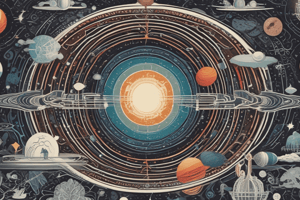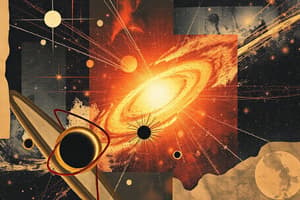Podcast
Questions and Answers
What does the Big Bang Theory explain?
What does the Big Bang Theory explain?
- The uniform distribution of matter in space
- The eventual contraction of the universe
- How the universe began and expanded (correct)
- The universe's static position
How long ago did the universe start its expansion according to the Big Bang Theory?
How long ago did the universe start its expansion according to the Big Bang Theory?
- 10.5 billion years ago
- 13.8 billion years ago (correct)
- 20 billion years ago
- 4.5 billion years ago
In the bread-raisin model, what do the raisins represent?
In the bread-raisin model, what do the raisins represent?
- Stars in the universe
- The fabric of space-time
- Planets within galaxies
- Galaxies in the universe (correct)
What does the bread represent in the bread-raisin model?
What does the bread represent in the bread-raisin model?
According to the bread-raisin model, what happens to the distance between the galaxies?
According to the bread-raisin model, what happens to the distance between the galaxies?
What leads to the formation of stars and galaxies?
What leads to the formation of stars and galaxies?
What is indicated by the presence of distant galaxies with redshifts?
What is indicated by the presence of distant galaxies with redshifts?
What event does the Big Bang theory suggest the universe started from?
What event does the Big Bang theory suggest the universe started from?
Which process is responsible for the formation of elements such as hydrogen and helium?
Which process is responsible for the formation of elements such as hydrogen and helium?
What is a primary piece of evidence supporting the Big Bang theory?
What is a primary piece of evidence supporting the Big Bang theory?
Flashcards are hidden until you start studying
Study Notes
Overview of the Big Bang Theory
- Cosmological model explaining the origin of the universe.
- The universe began expanding approximately 13.8 billion years ago.
- Not a literal explosion, but an expansion of space itself.
Bread-Raisin Model
- Analogy comparing the universe to bread, with galaxies as the raisins.
- In an uncooked state, the bread (universe) is 30 cm wide with 8 dots (galaxies); when rising, it expands to 60 cm with 10 dots.
- Galaxies themselves are not expanding, but the space between them increases.
Distance Relations and Expansion
- In an expanding universe, the distances between galaxies continually increase.
- As the universe expands, matter becomes more diluted.
Singularity
- The universe originated as a "singularity," a point of high temperature and density, possibly at the core of a black hole.
- Intense heat during this phase led to the formation of matter and antimatter particles, which were annihilated on contact.
Nucleosynthesis
- Refers to the formation of light elements like hydrogen (H) and helium (He).
- These elements are fundamental for the formation of stars and galaxies.
- Stars are essential for creating other cosmic bodies, including planets, comets, and asteroids.
Evidence Supporting the Big Bang Theory
- Observable expansion of the universe.
- Cosmic microwave background radiation detected throughout space.
- High abundance of light elements, especially hydrogen and helium.
- Distant galaxies exhibit redshifts, indicating they are moving away.
- Well-documented formation of stars and galaxies over time.
Studying That Suits You
Use AI to generate personalized quizzes and flashcards to suit your learning preferences.




